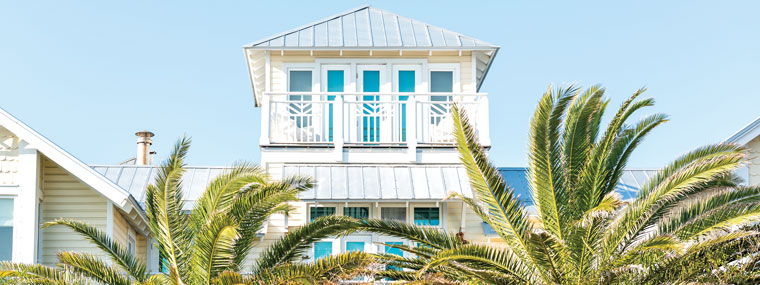
How to “Summerize” Your Florida Home
By Marisa A. Rains, LCAM / Published October 2022

Summer has ended, and fall begins with thoughts of traveling south to sunny Florida, which brings a smile to the snowbirds’ faces. They dream about sunny beach days, mild winter temperatures, pristine parks, and nature trails. Snowbirds spend much effort and time winterizing their homes in preparation for the long, cold winter months before they travel south. The same amount of energy should be put into preparing their Florida homes when heading back north. The time it takes to winterize one’s home should also be spent summerizing one’s home before heading back north for the summer months.
As the snowbirds travel south in the fall, their excitement increases the closer they get to their home away from home. They arrive at their beautiful home or condominium unit, and as they enter, their excitement quickly fades away. The moment they open the front door a strong mildew smell hits them in the face, followed by water sloshing as they make their way in. What horror! What happened? How did this happen? In the six months their home was closed up, their 12-year-old water heater rusted out at the bottom and flooded their home. Their excitement of spending time on the beach relaxing turned into a nightmare. Now they face the stress of finding temporary accommodations, filing an insurance claim, meeting with insurance adjusters, and meeting with vendors, such as water restoration and mold remediation contractors. They are devastated to see the state of their once beautiful vacation home. How could this have happened? More importantly, how could this have been prevented? There are many factors to consider when owning a seasonal home. It is best to service your home’s interior and exterior plumbing and mechanical equipment while you are in town and not wait.
How to “Summerize” your home
Air conditioning system—Contact an air conditioning contractor to set up an annual service agreement and schedule the service while you are present. It is important to keep your air conditioning system in good working order to ensure the system is maintaining the air quality at the recommended industry-standard humidity levels to minimize mildew, leaks, and condensation buildup.
Plumbing system—Contact a plumber to inspect all plumbing connections throughout the home—under the sink water shut-off valves, water heaters, toilet valves, etc. Repair or replace water shut offs as needed. A water heater’s life expectancy in Florida is approximately 10–15 years. Water heaters are generally kept in a hall closet or in an attic where they are out of sight, out of mind. It is important to inspect and service your water heater annually. If there are any signs of rust or the life expectancy is nearing the end, don’t wait but replace your water heater now. Water heaters can cause thousands of dollars in damages to a home or condominium.
Pool—It is important to continue with your pool service com-pany while you are gone. Pools are a huge investment and require constant upkeep and maintenance. Talk with your pool contractor to arrange for pre-storm preparation and post-storm clean up. It is important to have a good working relationship with your pool contractor.
Landscaping and irrigation—Maintain your landscaping and irrigation systems year-round. Your landscape contractor is another set of eyes on your property while you are away during the summer months. Having an excellent landscape contractor you can trust will ensure your landscaping is kept healthy and lush.
Gutters—Gutter cleaning is imperative to maintain on a regular schedule. If your home is surrounded by trees, keep them trimmed or the leaves will contribute to clogging the gutters. Clogged gutters may lead to water backing up, and over time it may find its way into your home, causing damage.
Roof—Contact a roofer to schedule an annual roof inspection. Make repairs as needed to minimize the risk of a roof leak.
Hurricane shutters—If you have hurricane shutters that require manual installation, arrange for a handyman to install your hurricane shutters before you head north. If you are purchasing new hurricane shutters, check with your homeowner’s association rules and regulations before purchasing them. Homeowner associations require permission from the Architectural Control Committee (ARC) on the design, type, and installation of hurricane shutters. Don’t wait until the last minute; plan ahead if you are considering purchasing hurricane shutters.
Pest Control—Contract with a pest control company to service your home to keep critters away. In addition to keeping the critters at bay, you will have another set of eyes on your home. Ask your pest control contractor to notify you immediately if there is something amiss. Working together with loyal vendors is imperative.
Florida’s weather is very unpredictable. Hurricane season begins May 1st and runs through November 30th each year. In preparation to head back north, store away all outdoor patio furniture, grills, lawn ornaments, potted plants, garbage cans, etc. inside your home or garage. Empty the refrigerator of all perishables and eliminate all garbage from the home. Trim all trees around the home. Contact your insurance agent to discuss your home’s insurance policy. It is important to understand your coverages and deductibles should something happen while your home is unoccupied.
There are so many things that can go wrong while a home is unoccupied. Have a neighbor, relative, or someone you can trust check on your home monthly. If you do not have anyone nearby to check on your home, then search for a home watch professional. This is a growing industry in Florida. To find a reputable home watch professional in your area, search online at www.national homewatchassociation.org. A home watch professional will provide a snowbird with peace of mind while their home is unoccupied by performing regularly scheduled home visits. During those visits the home watch professional will perform a visual inspection of the exterior and interior of the home and turn on and run all water taps, flush toilets, check under cupboards and in closets looking for leaks or mildew, check the humidity levels in the home, check doors and windows, check refrigerator and freezer temps, etc. The home watch professional will provide a written, detailed report to the homeowner after each visit along with pictures. If the home watch inspector finds an issue, the owner is notified immediately.
Lastly, if you live in a homeowners association or condominium association, it is important to update your contact information with your management company or board of directors. Let them know when you will be away and who they may contact in the event of an emergency.
Marisa A. Rains, LCAM
Corporate Manager, Watson Association Management
Marisa A. Rains, LCAM, is corporate manager at Watson Association Management. For more information, call (772) 871-0004, email marisa@watsonrealtycorp.com, or visit www.watsonassociationmanagement.com.




